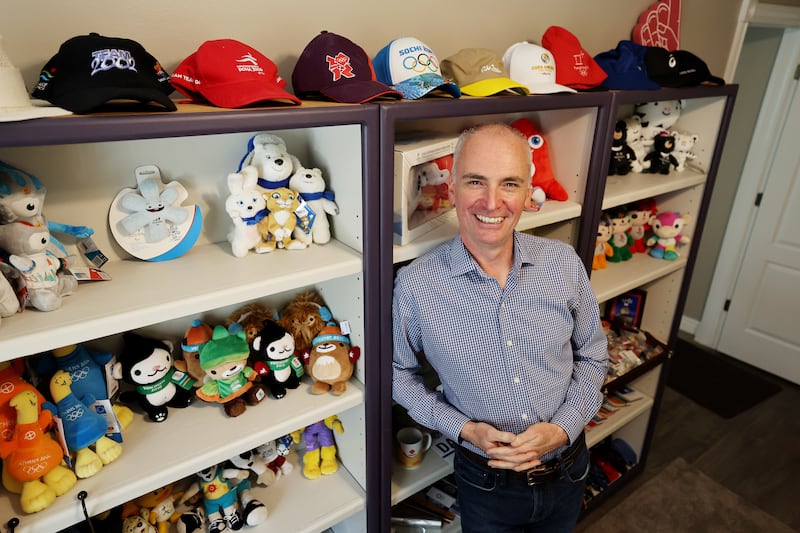A small back room on the first floor of Darren Hughes’ Cottonwood Heights home is filled with Olympic memorabilia, including dozens of colorful stuffed mascot dolls dating back to Utah’s 2002 Winter Games.
But Hughes, who serves as bid lead for Salt Lake City’s effort to bring another Winter Games to the state in 2030 or 2034, zeros in on a pile of pocket-sized guidebooks tucked away on a lower display shelf.
“Something that’s fun that’s not particularly sexy,” the exuberant 51-year-old said, grabbing the overstuffed manual he helped assemble for the 2002 workforce at the start of what turned into an international Olympic consulting career.
“One of the things they carry all day during the Games is just this little pocket guide. It’s like the culmination of all the really, really critical information that a workforce member needs to know,” Hughes explained.
For someone whose goal after graduating from the University of Utah and Arizona State University was to run human resources for a Fortune 500 company, it’s the spiral-bound compilation of Olympic maps, schedules and other data that are the real collectibles.
“To me, this is kind of like a little visual of what happens, what is the outcome,” of all the effort it takes to recruit, train and outfit tens of thousands of mostly volunteers who’ll be out of a job once a Games is over, Hughes said.
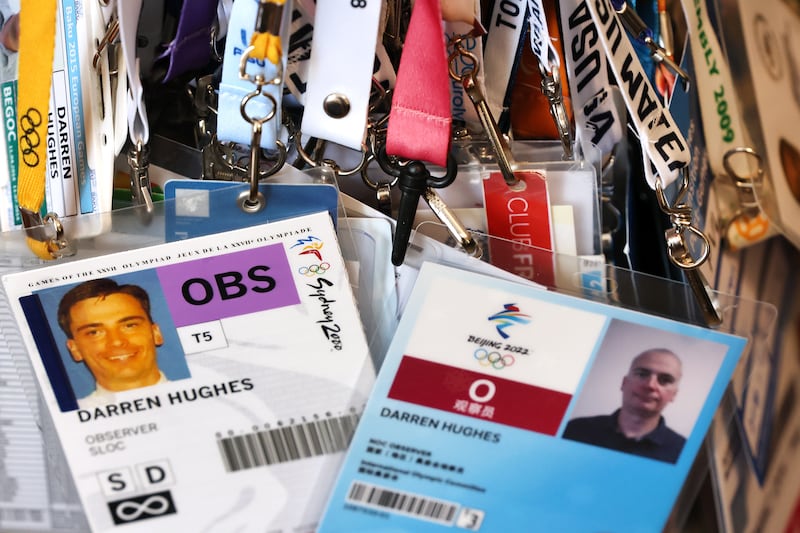
What a ‘bid lead’ does
As the only full-time employee of the Salt Lake City-Utah Committee for the Games, he’s responsible for assembling thousands of pages of details that make up a bid under the International Olympic Committee’s new selection process.
“He basically organizes all of the technical work. Everything,” said Fraser Bullock, president and CEO of the bid committee, putting together specifics about everything from the number of seats available for each event to water use during the year the Games are held.
The stacks of spreadsheets, maps, contracts, vision statements, sustainability plans and other information needed to complete the IOC’s 39-page “Future Host Questionnaire” are nearly all ready, even though nothing’s due until the next stage of the bid process.
Hughes, who was brought on board shortly after the bid committee was created in early 2020 and has quietly labored behind the scenes ever since, is “the heart of that work,” Bullock said. “He’s simply amazing.”
The privately funded bid committee is only paying a total of four people out of a $3.7 million budget to bring another Olympics to Utah, Bullock said, declining to disclose how much they’re being paid, but he said he hopes to limit the price tag for bidding to less than $2 million.
He and Hughes worked together on the 2002 Games. As chief operating officer, Bullock saw firsthand how Hughes helped grow the workforce to 50,000 people, including 24,000 volunteers recruited with the slogan, “Hard Work. No Pay. Long Hours. Better Hurry.”
Hughes said it had taken a “little bit of a leap of faith” for him to leave the benefits department of a major telemarketing company in his early 20s and follow his boss to the Salt Lake Organizing Committee that was responsible for putting on the 2002 Games.
“The Olympic Games were something you watched on TV,” he said, acknowledging some trepidation about how his career plans would be affected by taking a four-year detour from the traditional route to a top corporate job.
Organizing the Salt Lake City Games turned out to be an “HR paradise,” Hughes said, “because you go through the full life cycle of an organization in seven years, from start-up to rapid growth to intense execution. Then you close down the company.”
That makes the “people challenge” all organizations face even more critical to the Olympics, he said. “I know you need the athletes and they’re the heart of the Games, and you need venues, you need a field of play. But it’s people that actually put on the Games.”
The intensity of preparing for one of the biggest and most watched sporting events was also appealing, Hughes said, so “one of the things that got me addicted was the pace ... if you asked me my strengths, one of them is speed. I can do things quickly.”
Ed Eynon, the telemarketing company boss who brought Hughes to the organizing committee, called him a crucial “right elbow,” who served as a “sounding board in the planning and organization of everything.”
“Darren, I could have him do about anything and he was good at it,” said Eynon, now a top executive at a Southern California-based equity firm who commutes from his Fruit Heights home.
Hughes’ assignments include overseeing staffing systems and running the uniform distribution center, but his real value came during frequent brainstorming sessions, Eynon said, calling his former colleague a quick study who works hard and is “a whiz at analysis.”
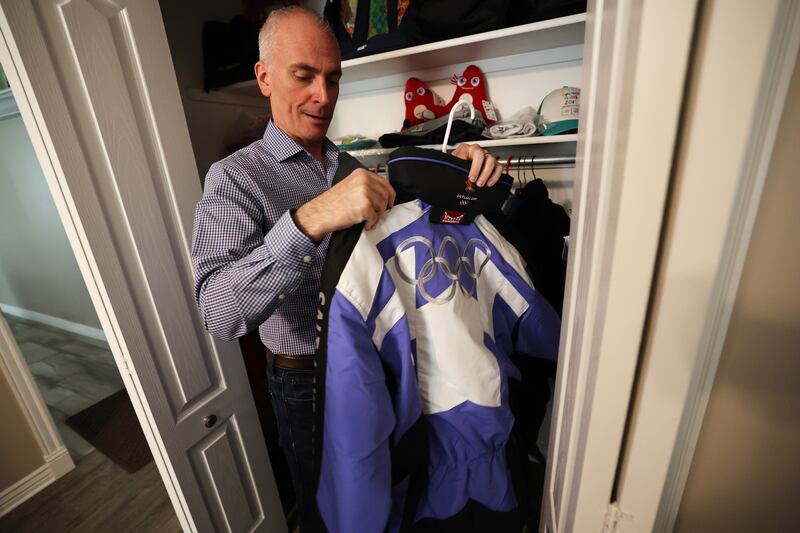
‘A mild-mannered American’
After the 2002 Games, Hughes was looking at reentering the corporate world, but the consulting projects he was picking up felt like “just more traditional HR stuff, not very exciting.”
Then the International Olympic Committee came calling.
Hughes was hired by the Switzerland-based IOC first as a consultant and then as a full-time employee to run a relatively new “knowledge transfer” program, intended to help organizers share what they’d learned with future host cities.
“When the IOC reached out, I of course said yes. Although that was a bit of a big jump, actually,” Hughes said. Still, he and his wife “decided, let’s go for it. Because when else would you get a chance to move abroad?”
The experience, which lasted three years, changed the course of his career.
“It was an amazing job that really took me out of just HR, just the people side, and gave me exposure to everything in terms of Games organization,” he said. “It was a blast. We did workshops on everything.”
That breadth of understanding helped Hughes build a “little bit of a niche market” in the rarified world of Olympic consulting following his return to Utah to be closer to family after the birth of the first of his two children, now 16 and 18.
He usually has more than one client at a time, and is “technically still a consultant” for the next Olympics, the 2024 Summer Games in Paris, after being empaneled as an expert in workforce planning and operations.
“I’ve always felt like I could go back and get a real job ... if I had to,” Hughes said. But after a few years of success at events like the 2007 Pan American Games in Rio de Janeiro, he said “the next project was always there. I haven’t really been too worried.”
James Tolputt, then head of Games operational readiness at the IOC, engaged Hughes as a “people management” adviser for multiple Olympics, starting with the 2014 Winter Games in Sochi, Russia, and continuing through the Paris Games.
His focus was helping organizers headquartered more than 800 miles away in Moscow find the necessary volunteers and other workers, Tolputt said, part of the IOC’s “checking and balancing what was happening, assuring ourselves that the delivery was sound.”
The IOC wants host cities “to feel like they’re doing it themselves, and they’re doing it in a very nationalistically and culturally relevant” way, he said, “The worst-case scenario for the IOC is that the same mistakes are made from one edition of the Games to the next.”
Hughes was a good match for the IOC’s goals, said Tolputt, now a British-based consultant who has continued to work with Hughes, at the World Athletics Championships held in Oregon in 2022 after a yearlong delay due to the COVID-19 pandemic.
“As an American, he’s quite a mild-mannered American,” he said. “Every culture has different traits. But we liked Darren because he was a great listener and really, the IOC, that was our primary role, to really try and understand how things were being done.”
Rather than taking a “teller, ‘Do this, do that,’ type of approach, it was very much more of an inquiring approach that we adopted at the IOC,” Tolputt said. “Darren fitted that profile very well. He was happy to try new things. He was happy to be educated on local culture.”
One of the organizers of Tokyo’s 2020 Summer Games, held a year later because of the pandemic, said that was her experience working with Hughes.
“Indeed he is American, but sometimes it feels like he is Japanese. This means, there were a mutual respect and close relationships to the extent that we feel like sharing the same language,” said Akiko Nagano, director of planning and coordination for the Tokyo Games.
Nagano said he helped organizers focus on simplification after the postponement, “to optimize the operation and save the cost, to organize the Games in a sustainable manner. Then, we moved on to the COVID countermeasures.”
That meant adjusting when workers were hired and making sure the workforce could safely provide needed services at Games times, through “strict safety regulations, such as social distancing, testing, etc.,” she said.
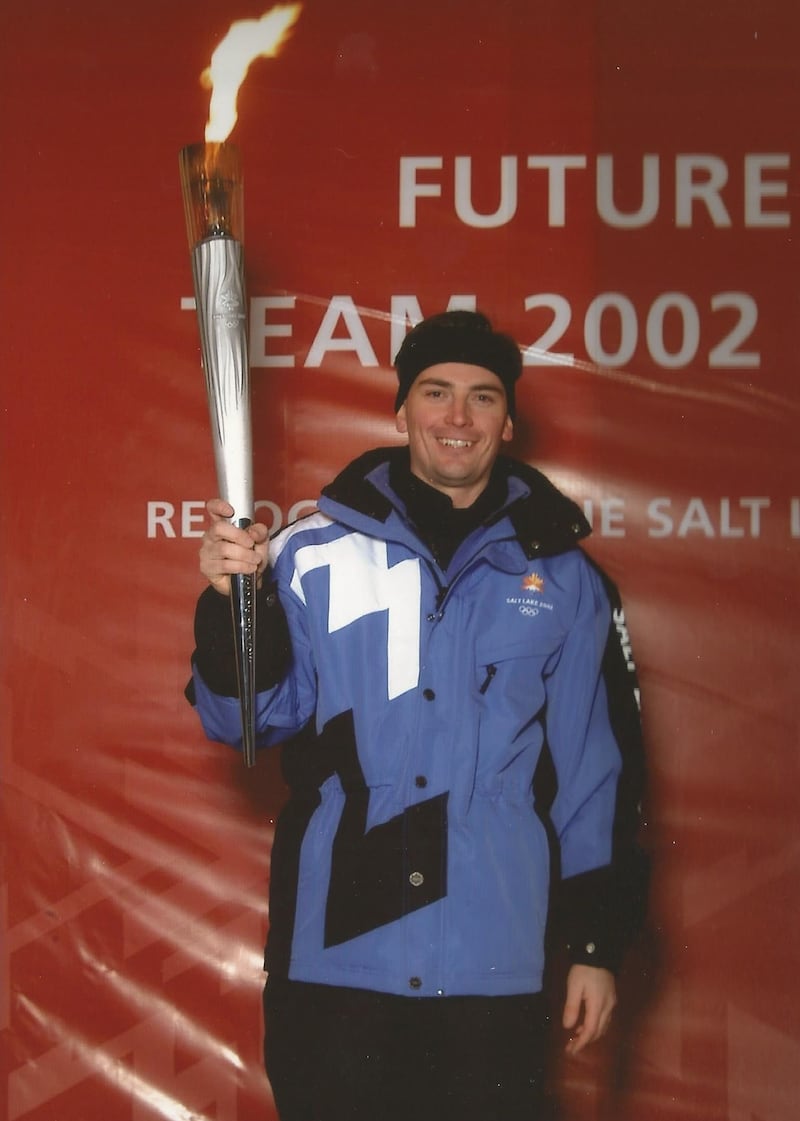
A favorite in Hughes’ roomful of Olympic memorabilia is a scrapbook put together by the people he worked with over what turned into an eight-year lead-up to the Tokyo Games, filled with snapshots and notes thanking “Darren-san” for his help.
“That was just so cool, as busy as they were,” Hughes said as he flipped through the pages. “I went there and loved it. They have an amazing culture. The way they treat people, treat each other. There’s some challenges with that because decision making is by consensus.”
For next year’s Paris Games, Hughes has been involved on behalf of the IOC with workforce planning and services as well as the volunteer program, the organizing committee’s volunteer director, Alexandre Morenon-Condé, said.
The collaboration has gone “very well,” Morenon-Condé said, “because Darren has the ability to pass on the knowledge he has acquired over more than 20 years of working with organizing committees on a wide range of issues.”
At the same time, he said, Hughes takes “into account the cultural and geographical particularities of organizing the Games in Paris. He helps us to ask the right questions and shares with us a range of possible options for solving problems.”
‘We know we’re going to get a Games.’ But when?
Utah’s hopes of hosting another Olympics in 2030 or, preferably, 2034 to avoid competing for domestic sponsorship revenues with the 2028 Summer Games in Los Angeles, isn’t Hughes’ first bid committee experience.
He consulted for Rio de Janeiro’s and Paris’ bids, as well as Madrid’s unsuccessful attempt to land the 2020 Summer Games, the last time the IOC expected to see elaborately designed books containing the details of a proposed Olympics.
“We still do a bid file and we’re still going to graphic design it. But it’s no longer this magnificent, like piece of art that you would then stick on a coffee table for years to come,” he said. “We had to glam it up in the old bid process.”
Holding a lavishly bound book detailing the Spanish bid’s financial information, one of a package submitted to the IOC that cost some $200,000 to put together, Hughes said the change is for the better.
“We’re doing it in a big, fancy spreadsheet right now and not doing this approach,” he said. “I mean, these pages of narrative about your budget? Fortunately, we’ve done it before so we have some credibility.”
An even bigger change for Hughes than the new, less formal bid process that’s only been used once before, to select the 2032 Summer Games host, Brisbane, Australia, may be that his current client isn’t some faraway place.
“It’s obviously really, really cool,” he said. “It feels really good, especially bringing the Games back home because these were my first Games, 2002 ... and they will always be special. Although there have been lots of cool events I’ve been part of.”
But there’s a difference.
“The other bids I’ve worked on, you’re not this emotionally invested because you’re a consultant, You’re writing a file or you’re developing a financial book or whatever, but it’s not yours. So I feel a little more invested,” Hughes said.
He also believes the new bid process, which focuses on ongoing discussions between the IOC and bid cities to ready them to host, makes another Olympics in his home state a sure bet.
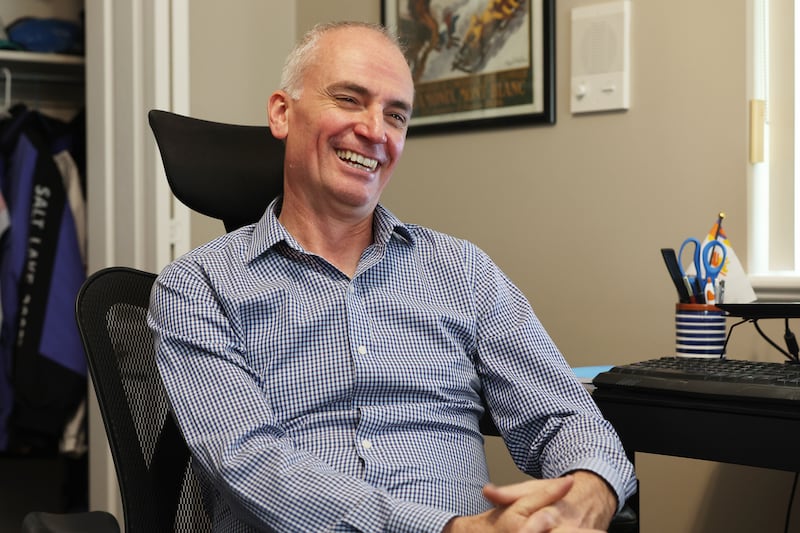
“We know we’re going to get a Games. We know it’s coming, whereas there were losers before. That feeling of being in Buenos Aires when Madrid lost, and then kind of having to put a smile on your face and go sit there at the press conference, that’s tough,” he said.
“You could invest all of this heart and soul into it and lose,” Hughes said, quickly adding, “I don’t think that’s the outcome we’re going to get. I think the IOC is really excited about bringing the Games back to Utah.”
Why? “They like Utah. They know that 2002 was a great Games and has delivered a really positive legacy. Therefore, they know we have the capability and we have the desire to host again,” he said. “I have no doubt we’re getting something.”
But whether that’s the 2030 or the 2034 Winter Games is still unclear, as is when the IOC Executive Board will finally decide whether to advance Salt Lake City; Sapporo, Japan; Vancouver, Canada; Sweden; Switzerland or France to contract negotiations.
“I don’t know which one. I don’t know when. I change my PowerPoints all the time,” Hughes said, as speculation swirls around a decision coming at meetings scheduled in October and December, with ratification by the full IOC membership some time next year.
“While they sort that process out, we are just doing our thing,” he said.

